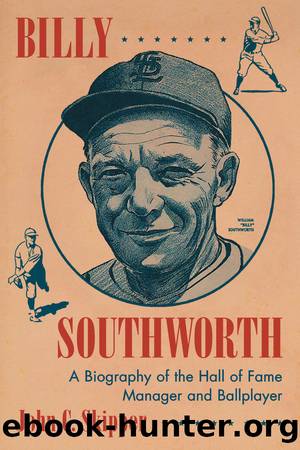Billy Southworth by John C. Skipper

Author:John C. Skipper
Language: eng
Format: epub
Publisher: McFarland & Company, Inc., Publishers
Published: 2013-04-08T00:00:00+00:00
For Southworth, perhaps his redemption as a big league manager was complete when, eight years after he had been tossed overboard and was selling cotton seed oil in Columbus, The Sporting News named him the National Leagueâs Manager of the Year.
Billy went home to Ohio to work on the home he was building for his family on an acreage in Sunbury, about 20 miles southwest of Columbus. It would be a year before the house was built, a perfect spot for the Southworths, close to the big city and yet a get-away, a place for Mabel to establish her special brand of homelife for Billy, for six-year-old Carole and there would be a room for Billy Jr. for when he came home, filled with his books, his sports awards, his memorabilia. And not far from the family home, there would be places to hunt, fish and horseback ride.
Billy began hauling 104 loads of stone from a nearby quarry on December 7, 1941, a quiet, not-quite-winter Sunday afternoon when the people of Sunbury and across the nation were shaken by the news that the war had reached American territory. On this day, âa day that will live in infamy,â as President Franklin D. Roosevelt called it, the Japanese bombed the U.S. naval base at Pearl Harbor, killing and injuring thousands of Americans. Within 24 hours, the United States declared war on Japan.
Billyâs mind and his heart had to be racing. Where was Billy Jr.? Would he be cast into battle? Would he be safe?
And what would this mean to America, to the God-fearing, peace loving people of Sunbury and their brothers and sisters all across the country?
And what would this mean for baseball which was, next to his family, the heart and soul of Billyâs countenance?
Baseballâs commissioner, Judge Kenesaw Mountain Landis, who had been the czar of the game for more than 20 years and who had overseen the rebirth of the game after the Black Sox scandal of 1919, would now have to see the sport through another troubling time. Landis, a lifelong, die-hard Republican who detested President Roosevelt and had said so publicly, now wrote to the commander in chief, the nationâs most prominent Democrat, pledging baseballâs support to the war effort, whatever sacrifice that might mean, including cancellation of the upcoming baseball season.
Roosevelt responded with what has come to be known as the âgreen lightâ letter. On January 15, 1942, he wrote to Landis, saying the ultimate decision concerning the upcoming baseball season was up to the owners. So he would offer a personal, rather than an âofficialâ point of view.
âI honestly feel it would be best for the country to keep baseball going. There will be fewer people unemployed and everybody will work longer hours and harder than ever before. And that means they ought to have a chance for recreation and for taking their minds off their work even more than before ... if three hundred teams use five thousand or six thousand players, these players
Download
This site does not store any files on its server. We only index and link to content provided by other sites. Please contact the content providers to delete copyright contents if any and email us, we'll remove relevant links or contents immediately.
Periodization Training for Sports by Tudor Bompa(8250)
Bodyweight Strength Training by Jay Cardiello(7902)
Therapeutic Modalities for Musculoskeletal Injuries, 4E by Craig R. Denegar & Ethan Saliba & Susan Saliba(7710)
Born to Run: by Christopher McDougall(7120)
Imperfect by Sanjay Manjrekar(5869)
Wiseguy by Nicholas Pileggi(5766)
Shoe Dog by Phil Knight(5255)
Paper Towns by Green John(5175)
The Body: A Guide for Occupants by Bill Bryson(5076)
The Rules Do Not Apply by Ariel Levy(4955)
Tuesdays with Morrie by Mitch Albom(4767)
Endurance: Shackleton's Incredible Voyage by Alfred Lansing(4759)
Bodyweight Strength Training Anatomy by Bret Contreras(4666)
The Sports Rules Book by Human Kinetics(4377)
Yoga Anatomy by Kaminoff Leslie(4355)
Machine Learning at Scale with H2O by Gregory Keys | David Whiting(4290)
Dynamic Alignment Through Imagery by Eric Franklin(4205)
Science and Development of Muscle Hypertrophy by Brad Schoenfeld(4121)
Exercise Technique Manual for Resistance Training by National Strength & Conditioning Association(4057)
